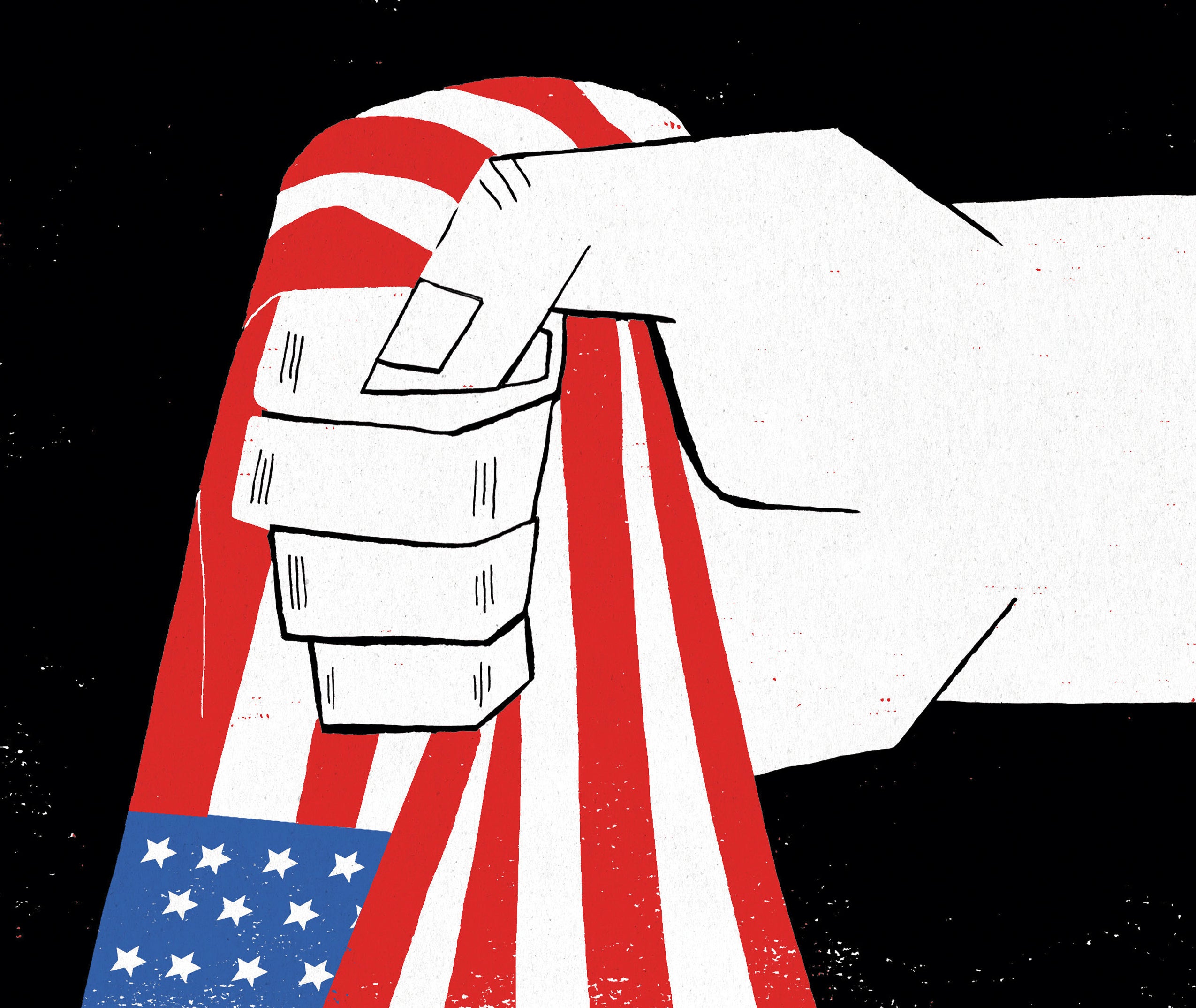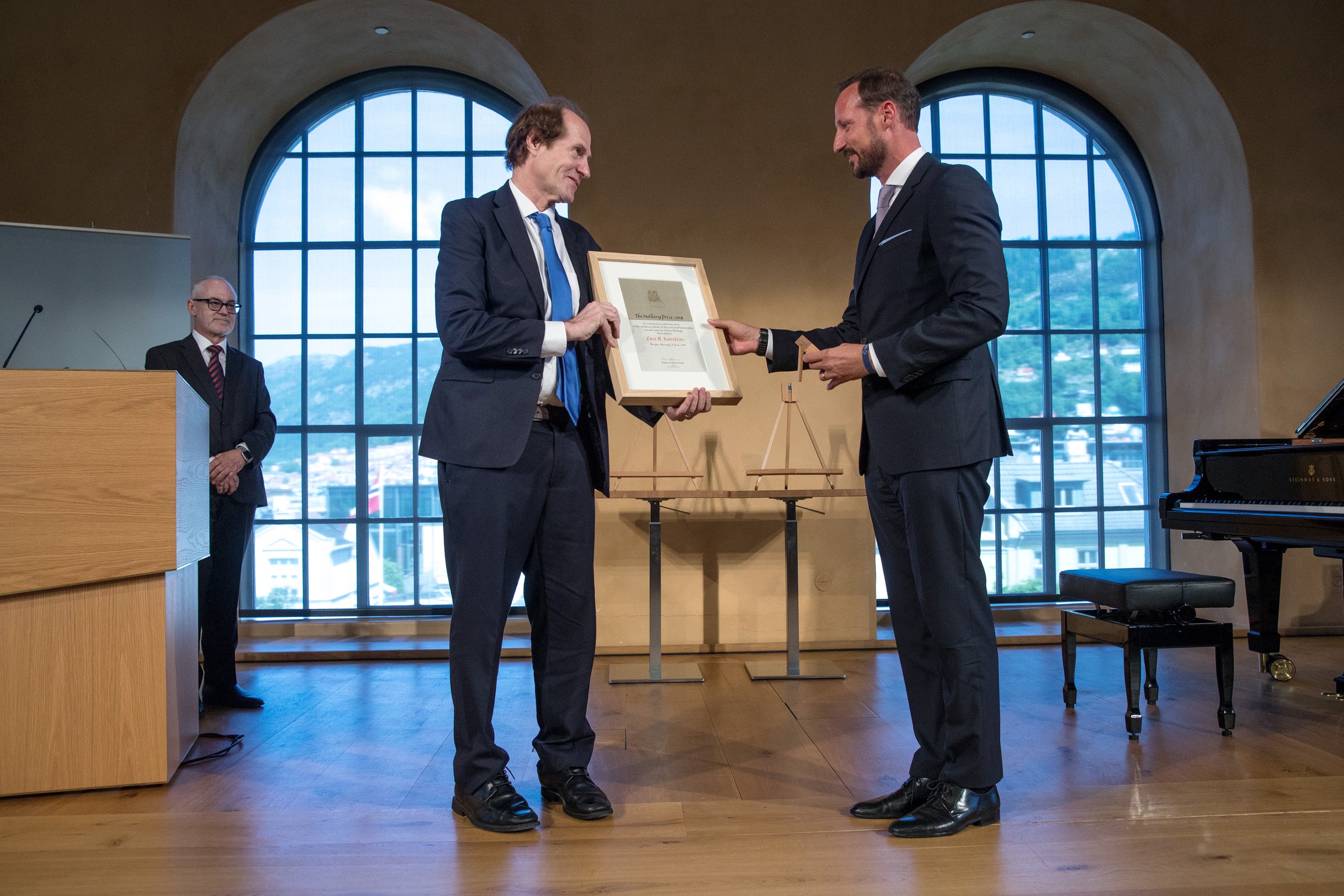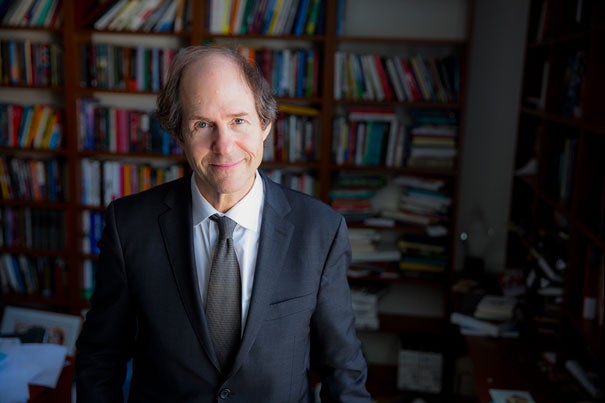People
Cass Sunstein
-
A State of Danger?
June 25, 2018
"It Can't Happen Here," the novel by Sinclair Lewis written in the 1930s as fascism was rising in Europe, imagines an America overtaken by an authoritarian regime. The new book edited by Harvard Law Professor Cass Sunstein ’78, "Can It Happen Here?: Authoritarianism in America" (Dey Street Books), does not predict the same fate. Yet the contributors—several also affiliated with Harvard Law—take seriously the possibility that it could happen here, despite the safeguards built into the American system of government.
-
The USDA Is Right: Bioengineered Foods Don’t Need Labels
June 19, 2018
An op-ed by Cass Sunstein. Should a federal agency issue a regulation that will impose up to $3.5 billion in costs next year, and billions more in the coming decade – while delivering essentially no benefits? That sounds crazy. But a few weeks ago, the U.S. Department of Agriculture proposed to do exactly that. OK, not exactly – but pretty close. The proposal is the outgrowth of the longstanding national battle over whether to require labels for bioengineered (or genetically modified) foods.
-
The Perfect Way to Help Heal a Divided Country
June 12, 2018
An op-ed by Cass Sunstein. Might the World Cup, which starts this week, reduce ethnic divisions and political violence? Absolutely. To see why, we have to back up a bit. All over the world, many people closely identify with their religion, their race or their ethnicity – and much less with their country. That can be a serious problem. When people separate themselves from their fellow citizens, they tend to distrust each other. They become less able to address shared challenges. They regard each other as strangers – and, in extreme cases, as enemies.
-
Cass Sunstein ’78, the Robert Walmsley University Professor at Harvard University and renowned legal scholar and behavioral economist, received the prestigious Holberg Prize at the University of Bergen, Norway, on June 6.
-
Get Ready for a Future With a Genetic Crystal Ball
June 5, 2018
An op-ed by Cass Sunstein. Would you like your doctor to give you the results of genetic tests, informing you if you are susceptible to serious diseases, such as cancer and heart disease? Before long, that question is going to be relevant to millions of people. Primary-care doctors will increasingly be in a position to offer genetic testing as part of routine care – just as they check your blood pressure and cholesterol levels. In most contexts, it’s tempting to think: the more information, the better. But that’s much too simple.
-
Would You Go to a Republican Doctor?
May 25, 2018
An op-ed by Tali Sharot and Cass R. Sunstein. Suppose you need to see a dermatologist. Your friend recommends a doctor, explaining that “she trained at the best hospital in the country and is regarded as one of the top dermatologists in town.” You respond: “How wonderful. How do you know her?”Your friend’s answer: “We met at the Republican convention.” Knowing a person’s political leanings should not affect your assessment of how good a doctor she is — or whether she is likely to be a good accountant or a talented architect. But in practice, does it?
-
Holy Wars, American Style
May 23, 2018
An op-ed by Cass Sunstein. There has been a great deal of discussion of social division and polarization in recent times, but those terms are inadequate. What besets the United States is much worse. Both the right and the left are increasingly defined by a form of Manichaeism, in which the forces of light are taken to be in a death struggle with the forces of darkness. We are in a Manichaean moment.
-
...Today, the impeachment of Donald Trump exists on the brink of plausibility. The sine qua non of an impeachment investigation, to say nothing of actual votes to charge and remove the President, is a Democratic takeover of the House in the November elections. Such a change now looks better than possible, maybe even probable...Ultimately, every consideration of impeachment returns to the standard established in the Constitution...As in the nineteen-seventies and the nineteen-nineties, the prospect of a Presidential impeachment has spurred renewed academic interest in the subject, resulting in two recent volumes by well-known Harvard law professors. Last year, Cass Sunstein, who served in the Obama Administration, released “Impeachment: A Citizen’s Guide,” and Laurence Tribe, the noted liberal academic and litigator, has just published “To End a Presidency: The Power of Impeachment,” written with Joshua Matz...Laurence Tribe told me that he would regard some forms of misbehavior as impeachable, such as “a pattern of abusing the bully pulpit of the Presidency, one of its most potent if informal powers—especially when amplified by social media—to stir division within the electorate to the point of violence, to give permission to white supremacists to weaponize their hatred, and otherwise to undermine the foundations of our republic.”
-
A New View of Antitrust Law That Favors Workers
May 15, 2018
An op-ed by Cass Sunstein. In the last half-century, the most innovative work in antitrust law came from the University of Chicago. According to the Chicago School, led by the legendary economist Aaron Director and promoted by law professor Robert Bork, the goal of antitrust law should be to increase consumer welfare, not to combat bigness as such. Chicago School proponents often argued in favor of government restraint. In their view, uses of the antitrust law to prevent mergers, or to break up large companies, often do more harm than good. Their arguments have had a major influence on both regulators and courts, frequently promoting a “hands off” attitude in the face of growing concentrations of economic power.
-
SC initiative to promote behavioural economics
May 10, 2018
The Supreme Committee for Delivery & Legacy (SC), in partnership with Qatar Foundation (QF), has launched an initiative to promote and share knowledge about behavioural economics in Qatar. Devised by the SC’s Qatar Behavioural Insights Unit (QBIU) and QF, the ‘Community of Practice for Behavioural Economics in Qatar’ hosted a discussion with Professor Cass Sunstein, the founder and director of the Programme on Behavioural Economics and Public Policy at Harvard Law School, at the SC’s Legacy Pavilion in Al Bidda Tower...Sunstein said he is impressed with Qatar’s commitment to behavioural economics and praised the work of the QBIU. “What I’ve noticed is that the World Cup is being seen by many as an opportunity to do something great in connection with football, and also things in relation to the type of challenges faced by many of the world’s nations, such as health issues and the promotion of entrepreneurship,” said Sunstein.
-
Behavioral Insights
May 9, 2018
A new interdisciplinary project at Harvard will explore how behavioral science and behavioral economics can help improve health outcomes for patients and decisions made by doctors. It also has the potential to increase cost-effectiveness. The project, Behavioral Insights Health Project at Harvard, is a University-wide partnership between faculty members at Harvard Medical School, Harvard Law School and other Harvard schools...The Project’s board of advisers, which is expected to grow, includes a wide range of faculty from the Harvard community, including Harvard Medical School, Harvard Law School, the Harvard T.H. Chan School of Public Health and the Harvard Kennedy School. [Cass] Sunstein said he expects the project to attract students and faculty from schools across the University, and, in particular, to draw on the research and expertise of the Behavioral Insights Group based at the Harvard Kennedy School. “We intend to share best practices, explore which interventions work and which do not, and find ways to reduce illness, suffering and premature mortality,” said Sunstein.
-
A President’s Guide to ‘Obstruction of Justice’
May 8, 2018
An op-ed by Cass Sunstein. There is talk these days about a complex and somewhat arcane legal concept: obstruction of justice. The term refers, broadly speaking, to willful efforts to interfere with the operations of the legal process, including criminal investigations. Let’s bracket the hardest definitional puzzles for now, and ask a question that could become pressing before long: What happens if special counsel Robert Mueller concludes that President Donald Trump has, in fact, obstructed justice? In answering, we should take a vow of neutrality. We should not allow our views about any particular president — negative or positive — to color our understanding of the meaning of the Constitution.
-
Harvard project will use behavioral insights to improve health care decisions and delivery
May 7, 2018
Harvard has announced the creation of a new, interdisciplinary project called the Behavioral Insights Health Project—a partnership between faculty members at Harvard Law School, Harvard Medical School, and other schools at Harvard that will explore how behavioral science and behavioral economics can help improve health outcomes for patients, and decisions made by doctors.
-
How Much Is It Worth to Use Facebook? It Depends
May 3, 2018
An op-ed by Cass Sunstein. People do not, of course, have to pay to use Facebook. It’s free. The company’s revenues come mostly from advertising. But in light of recent controversies, there have been discussions, at least outside of Facebook, about changing the business model. What if people had to pay to use it? How much would they be willing to spend? Any answers would tell us something important about the value of social media in general. I recently conducted a pilot experiment to obtain some preliminary answers. Using Amazon’s Mechanical Turk, I tried to find out, from 400 Facebook users, exactly how much the platform is worth.
-
Trump’s Promising Plan to Link Welfare to Work
April 24, 2018
An op-ed by Cass Sunstein. President Donald Trump’s “Executive Order on Reducing Poverty in America” has produced the expected political reactions. Because it focuses on saving taxpayer money and strengthening work requirements for federal programs, many conservatives are celebrating it, while many progressives have attacked it as punitive and dehumanizing. As it turns out, it’s a lot more interesting and subtle than either side has seen – and potentially more constructive.
-
Put Our Divisions Aside on Patriots’ Day
April 16, 2018
An op-ed by Cass Sunstein. Americans think of July Fourth as Independence Day – the anniversary of their nation’s birth, signaled by the signing of the Declaration of Independence. But if you really want to celebrate the country’s birthday, you might do that today. It’s Patriots’ Day. In a time of national tumult and division, let’s all raise a toast, and shed some tears. Recognized in just four states, Patriots’ Day commemorates the Battles of Lexington and Concord, where the American Revolution began on April 19, 1775. Every American should know the tale.
-
How to Stop Trump From Crossing the Line
April 12, 2018
An op-ed by Cass Sunstein. According to numerous reports, President Donald Trump is giving serious thought to firing Deputy Attorney General Rod Rosenstein, special counsel Robert Mueller or both. His lawyers should be telling him something pointed and specific: If the dismissal is aimed at shutting down Mueller’s investigation, it would probably be an impeachable offense. In any administration, the president’s lawyers quickly learn that one of their most important jobs is to say “no” to their boss – and to tell him things he does not want to hear.
-
The ruse of ‘fake news’
April 6, 2018
As Americans increasingly turn to social media as their primary source for news and information, the dangers posed by the phenomenon of “fake news” are growing...In a recent study described in the journal Science, lead authors Matthew Baum, the Marvin Kalb Professor of Global Communications, David Lazer, a professor at Northeastern University and an associate of the Harvard Institute for Quantitative Social Science, and more than a dozen co-authors argue that a multidisciplinary effort is needed to understand better how the internet spreads content and how readers process the news and information they consume. Such broad-based efforts are necessary, the authors said, “to reduce the spread of fake news and to address the underlying pathologies it has revealed.”...In addition to Baum and Lazer, the paper was co-authored by Yochai Benkler, Adam J. Berinsky, Kelly M. Greenhill, Filippo Menczer, Miriam J. Metzger, Brendan Nyhan, Gordon Pennycook, David Rothschild, Michael Schudson, Steven A. Sloman, Cass R. Sunstein, Emily A. Thorson, Duncan J. Watts, and Jonathan L. Zittrain.
-
A Bad Nudge From California
April 6, 2018
An op-ed by Cass Sunstein. Should coffee come with a cancer warning? As a matter of policy, the answer seems obvious: Of course not. As a matter of law, it’s much more complicated, at least in California. A tentative judicial ruling in Los Angeles County last week suggests that when people go to the local coffee place, their morning ritual is going to be accompanied by a jolt of fear. It could potentially turn into a fiasco, I think, and it tells us something important about how well-intentioned laws can go badly wrong.
-
How to Think About the Threat to America
April 2, 2018
An op-ed by Cass Sunstein. For the first time since the 1940s, Americans have been asking: Can it happen here? The question, which has been debated in the U.S. for months, is meant to draw attention to the potential fragility of democratic self-government -- and to emphasize that in some periods, democracies are especially likely to turn in authoritarian directions. It would be fair to pose that question in any case in light of China’s continued rise, Russia’s resurgent aggression, and the disturbing developments in Turkey, Poland, Hungary and the Philippines. To his most severe critics, some of the words and deeds of President Donald Trump make it seem as if democratic principles might not be entirely secure in the U.S. itself.
-
Nudge co-author Cass Sunstein on Taylor Swift, revolutionary spirit and behavioural economics for kids
March 26, 2018
An interview with Cass Sunstein. Home is a place where you can be entirely yourself — unshaven, feet up, unworried, slow heartbeat. I live in Concord, Massachusetts, where the American Revolution started. My house, which was built in 1763, played a role — munitions were held here on that fateful day, April 19, 1775, when a British Army force marched on the town to capture the hidden cache of arms. The house feels as if it has a bright, free, determined, revolutionary spirit.


